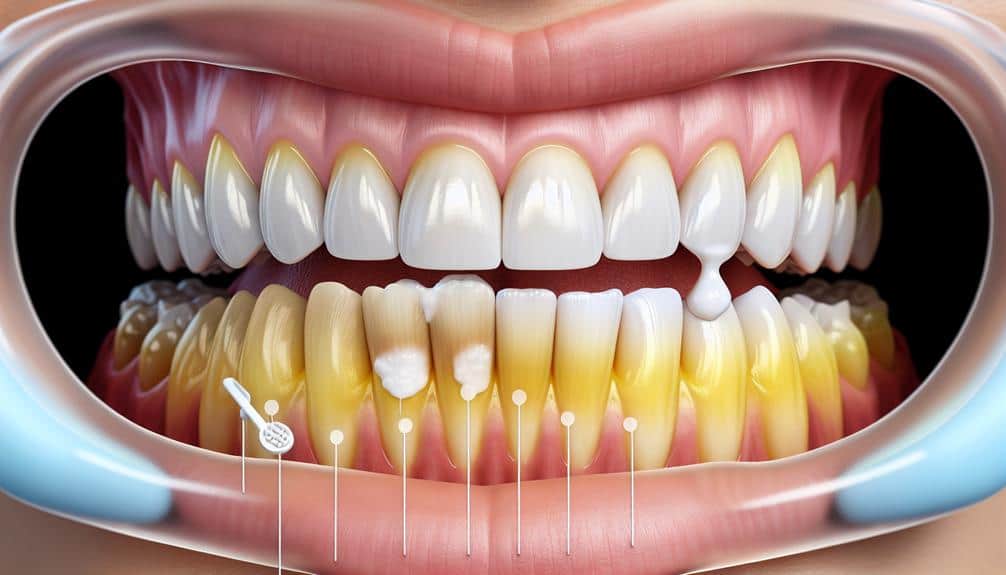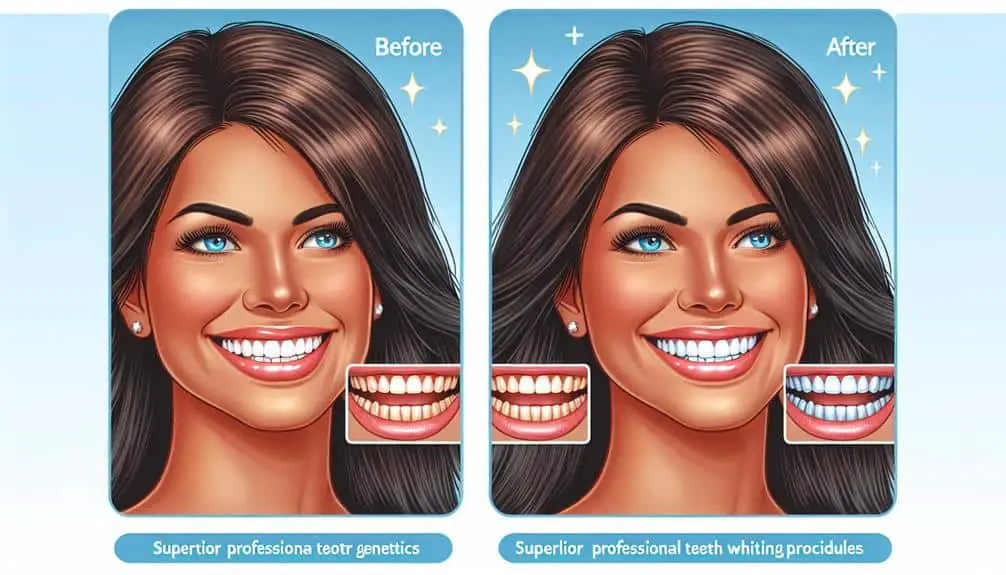When dealing with genetic tooth discoloration, consider professional whitening options for stronger agents tailored to your needs. Maintain consistent whitening routines and avoid staining foods and drinks like coffee and red wine. Consult your dentist for personalized treatment plans to achieve a brighter smile. Keep in mind the importance of patience in the whitening process and manage sensitivity with desensitizing toothpaste. Embrace your brighter smile for boosted confidence. These tips can optimize your journey to whiter teeth.
Key Points
- Consult a dental professional for personalized whitening options.
- Consider professional treatments for stronger whitening agents.
- Use whitening products with hydrogen peroxide or carbamide peroxide.
- Maintain consistent whitening routines for even results.
- Avoid staining foods and drinks to prolong whitening effects.
Understanding Genetic Tooth Discoloration
If you've ever wondered why your teeth seem to have a natural discoloration that doesn't respond to traditional whitening methods, you may be dealing with genetic tooth discoloration. Genetic causes play a significant role in determining the color of your teeth. This type of discoloration is often resistant to typical whitening treatments due to the intrinsic nature of the issue.
When it comes to genetic tooth discoloration, understanding that the color of your teeth is determined by the thickness of the enamel, the natural pigment of the dentin, and the scattering of light within the teeth is vital. While environmental factors like smoking, certain foods, and beverages can also contribute to discoloration, genetic influences are inherent and can be challenging to address solely through lifestyle changes.
Treatment options for genetic tooth discoloration may include professional treatments such as dental bonding, veneers, or crowns to cover the discolored teeth effectively. However, consulting with a dental professional to determine the best course of action based on your specific situation is crucial.
Choosing the Right Whitening Products
To effectively address genetic tooth discoloration, selecting the appropriate whitening products is vital for achieving desired results. When choosing whitening products, consider the various whitening techniques available. There are numerous options such as whitening toothpaste, whitening strips, at-home whitening kits, and professional whitening treatments. Each method varies with respect to application, duration, and effectiveness.
Product effectiveness is an important factor to keep in mind. Look for products that contain ingredients like hydrogen peroxide or carbamide peroxide, as these are known to efficiently whiten teeth. It's important to follow the instructions provided with the products carefully to ensure both safety and best results. Additionally, consider consulting with a dentist to determine the best whitening product based on your specific needs and the level of discoloration present.
Consistency Is Key
Maintaining a consistent whitening routine is essential for effectively combating genetic tooth discoloration. Consistency is key when it comes to achieving the best possible results in whitening your teeth. Here are three important reasons why consistency matters in your whitening journey:
- Effectiveness: Consistent whitening techniques, whether using at-home products or professional treatments, allow the active ingredients to work continuously on your teeth, ensuring a more even and thorough whitening process.
- Prevention of Staining: By sticking to consistent routines, you can prevent new stains from setting in and maintain the whiteness of your teeth over time.
- Long-lasting Results: Regular whitening maintenance sessions, in alignment with consistent routines, can help prolong the results of your initial whitening treatment, keeping your smile bright and vibrant.
Incorporating whitening techniques into your daily routine and maintaining consistent habits will help you achieve and sustain a brighter, whiter smile.
Professional Whitening Options
Consistent whitening routines can pave the way for exploring professional whitening options as a step towards enhancing the brightness of your smile. When at-home whitening techniques may not be yielding the desired results, seeking professional care can provide more effective solutions. Professional whitening options often involve stronger whitening agents that can only be administered by trained dental professionals. These treatments are tailored to your individual needs and can address stubborn stains that at-home products may not be able to tackle effectively.
Professional whitening procedures typically offer quicker and more noticeable results compared to over-the-counter products. Dentists may use techniques like light-activated whitening or custom-made trays to ensure even distribution of the whitening agent. Additionally, professional care can help minimize the risk of sensitivity often associated with whitening treatments, as dentists can monitor your progress and adjust the treatment as needed.
For those seeking a more immediate and potent solution to genetic tooth discoloration, professional whitening options provide a reliable and safe path towards achieving a brighter smile.
Avoiding Staining Foods and Drinks
Limiting your consumption of staining foods and drinks can play an essential role in maintaining a brighter smile and preventing tooth discoloration. Certain foods and beverages have the potential to stain your teeth over time, leading to discoloration that may impact your smile. To keep your teeth looking their best, consider the following:
- Coffee and Tea: These popular beverages are known to cause stains on teeth due to their high levels of chromogens. If you can't avoid them completely, try drinking through a straw to minimize contact with your teeth.
- Red Wine: The deep pigments in red wine can adhere to the enamel of your teeth, leading to discoloration. Rinse your mouth with water after enjoying a glass to help reduce the staining effects.
- Berries: While berries are nutritious, they can also stain your teeth due to their vibrant colors. Enjoy them in moderation and consider brushing your teeth shortly after consuming them.
Maintaining Oral Hygiene
To ensure excellent oral health, prioritize consistent and thorough brushing of your teeth twice a day. Use a soft-bristled brush and fluoride toothpaste, aiming for gentle circular motions to clean all surfaces effectively. Pay attention to your brushing technique, ensuring you reach the gum line and the back teeth. Flossing is equally essential; it removes plaque and food particles your toothbrush may miss. Incorporate flossing into your daily routine, gently guiding the floss between each tooth and along the gum line.
Your diet impacts your oral health more than you may realize. Limit sugary and acidic foods and drinks, as they can contribute to tooth decay and discoloration. Opt for teeth-friendly choices like crunchy fruits and vegetables that can help clean your teeth naturally. Additionally, be mindful of lifestyle habits such as smoking, which can stain your teeth and harm your overall oral health. By practicing good oral hygiene, making wise dietary choices, and adopting healthy lifestyle habits, you can maintain a bright and healthy smile.
Consulting With a Dentist
When it comes to addressing genetic tooth discoloration, consulting with a dentist is crucial. Dentists possess the expertise needed to evaluate your specific situation and recommend a tailored treatment plan.
Additionally, regular follow-up appointments with your dentist will guarantee the effectiveness of the whitening process and monitor any changes in your oral health.
Dentists Expertise Crucial
Consulting with a dentist is essential for effectively addressing genetic tooth discoloration and implementing successful whitening strategies. Dentists possess the expertise required to navigate the complexities of genetic factors influencing tooth color and treatment success. Here are three reasons why consulting with a dentist is critical:
- Personalized Treatment Plans: Dentists can tailor whitening treatments based on your unique genetic predispositions, ensuring the best results.
- Professional Recommendations: Dentists can recommend the most effective whitening methods that consider genetic influences, maximizing treatment success.
- Monitoring Progress: Regular check-ins with a dentist allow for adjustments to the whitening plan, ensuring safety and efficacy throughout the process.
Treatment Plan Customization
Handling the intricacies of genetic tooth discoloration requires a personalized treatment plan customized by a dentist to maximize whitening effectiveness. Consulting with a dentist allows for customization benefits tailored to your specific needs. Dentists can offer personalized treatment options based on the severity of discoloration, oral health status, and individual preferences. By customizing the treatment plan, dentists can guarantee that the whitening process is both safe and effective.
Factors such as the type of discoloration, underlying causes, and potential risks can all be taken into account during the customization process. This personalized approach enhances the overall whitening results and helps achieve a brighter, more confident smile. Trusted professional guidance assures that the treatment plan is optimized for your unique genetic tooth discoloration concerns.
Regular Follow-Up Appointments
To maximize the effectiveness of your whitening treatment for genetic tooth discoloration, scheduling regular follow-up appointments with your dentist is essential. Regular follow-up care plays a critical role in achieving ideal whitening results and maintaining the health of your teeth. Here are three reasons why follow-up appointments are crucial:
- Monitoring Progress: Dentists can track the progress of your whitening treatment during follow-up appointments, ensuring that you're on the right path to achieving your desired results.
- Adjusting Treatment: Your dentist can make any necessary adjustments to the whitening treatment plan based on how your teeth are responding, enhancing the effectiveness of the procedure.
- Preventive Care: Follow-up appointments allow for early detection of any issues that may arise post-treatment, enabling prompt intervention and ensuring long-lasting whitening results.
Patience in the Whitening Process
Being patient during the whitening process is crucial for achieving optimal results and maintaining the health of your teeth. Patience benefits the overall whitening progress by allowing the whitening agents to work effectively without causing harm to your teeth. Rushing the process or using whitening products excessively can lead to gum irritation, enamel damage, or uneven whitening results.
It's vital to understand that the whitening process takes time. Results aren't immediate, and gradual changes occur over multiple sessions. By being patient, you give the whitening products the necessary time to break down stains and discoloration effectively. This gradual approach ensures that your teeth whiten evenly and safely.
Moreover, practicing patience during the whitening process helps in managing expectations. While some individuals may see immediate results, others may require more time to achieve their desired level of whiteness. Remember, consistency and patience are key to a successful whitening journey. It's better to progress slowly and maintain the health of your teeth than to rush and potentially harm them in the process.
Managing Sensitivity Issues
Ensuring proper management of sensitivity issues is crucial during the teeth whitening process to minimize discomfort and maintain the health of your teeth. When dealing with sensitivity during whitening, consider the following:
- Use desensitizing toothpaste: Prior to starting the whitening treatment, switch to a desensitizing toothpaste containing potassium nitrate. This can help reduce tooth sensitivity during and after the whitening process.
- Limit whitening sessions: Avoid over-whitening your teeth to prevent increased sensitivity. Follow the recommended treatment duration and frequency provided by your dentist or the whitening product instructions.
- Consult your dentist: If you experience severe sensitivity that persists after whitening, consult your dentist. They can provide professional advice, recommend desensitizing treatments, or assess if there are underlying issues causing the sensitivity.
Embracing Your Brighter Smile
When moving forward after addressing sensitivity concerns, fully embracing your brighter smile is key to appreciating the results of your teeth whitening journey. Boosting confidence in your smile can have a significant impact on your overall well-being. Remember to maintain your bright smile by following essential dental care tips.
Regular dental check-ups are essential to make sure that your teeth and gums remain healthy post-whitening. Your dentist can provide guidance on maintaining your bright smile and address any concerns you may have. Brushing your teeth twice a day with a fluoride toothpaste and flossing daily can help prevent stains from reoccurring. Additionally, limiting foods and drinks that can stain your teeth, such as coffee, tea, and red wine, can prolong the effects of whitening treatments.
Frequently Asked Questions
Can Genetic Tooth Discoloration Be Completely Reversed With Whitening Treatments?
Genetic tooth discoloration may not be completely reversed with whitening treatments due to underlying factors. Treatment options can improve the appearance, but genetics play a role in determining whitening results. Consult a dentist for personalized advice.
Are There Any Long-Term Side Effects of Using Whitening Products on Genetically Discolored Teeth?
Using whitening products on genetically discolored teeth may have long-term risks like enamel damage and tooth sensitivity. Consult a dentist for safe treatment options that consider your dental health and minimize potential side effects.
How Can Genetic Tooth Discoloration Impact the Effectiveness of Professional Whitening Options?
Like a storm cloud looming, genetic factors can cast a shadow on the effectiveness of professional whitening. These inherent traits impact how well treatments work, influencing the outcome and requiring tailored approaches for best results.
Are There Any Specific Dietary Restrictions for Individuals With Genetic Tooth Discoloration Undergoing Whitening Treatments?
When undergoing whitening treatments for genetic tooth discoloration, consider dietary restrictions. Certain foods and drinks like coffee, wine, and berries can stain teeth. Discuss treatment options with your dentist for personalized advice on maintaining whitening effects.
Can Genetic Tooth Discoloration Be a Sign of Underlying Dental Health Issues That May Need to Be Addressed by a Dentist?
Genetic tooth discoloration can indicate underlying dental health issues that require a dentist's attention. It is essential to address these concerns promptly to guarantee excellent oral health and prevent potential complications in the future.



